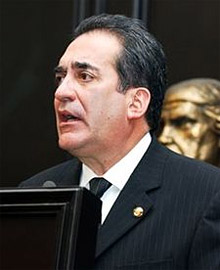
|  |  |  News Around the Republic of Mexico | October 2009 News Around the Republic of Mexico | October 2009  
Mexico’s Sales Tax Increase Is ‘Dead,’ Lozano Says
 Jens Erik Gould - Jens Erik Gould -
go to original
October 26, 2009


| | Senator Carlos Lozano de la Torre (Wikipedia) |  |
Mexico’s second-largest party in the Senate may reject key elements of the tax legislation and 2010 budget approved by the lower house, including an increase in the sales tax, Senator Carlos Lozano de la Torre said.

Raising the tax from 15 percent to 16 percent is “dead,” as is the original proposal of President Felipe Calderon’s to create a 2 percent consumption tax, said Lozano, vice coordinator of the Institutional Revolutionary Party, or PRI, in the Senate.

“All of society has collectively rejected the additional 1 percent on the sales tax,” Lozano, who is a member of the finance committee in the Senate, said in a telephone interview. “It doesn’t really resolve the needs of the state and it will tax people who can’t afford to pay it.”

The lower house on Oct. 21 approved the income portion of the 2010 budget and tax laws designed to strengthen finances and avert a credit rating downgrade as revenue and oil output fall. PRI senators later announced plans to pare back the tax increases in a revised bill, which would send it back to the lower house.

“There’s a political cost to raising taxes and I don’t think they want to be blamed for the increase in the value-added tax,” Rafael de la Fuente, chief Latin America economist at BNP Paribas SA in New York, said about the PRI in a telephone interview.

Oil Price

Instead of boosting public revenue through sales taxes, the PRI may propose to do so in part by raising the estimated price of crude in the 2010 budget to $65 a barrel from the $59 a barrel approved by the lower house, Lozano said. Oil provides almost 40 percent of government funds.

The PRI in the Senate may also reject a 3 percent tax on telecommunications services and an increase in duties on cash deposits, Lozano said. The party’s senators haven’t yet announced an official proposal, he said.

“The risk at this point is that PRI senators make a drastic modification to the income law for 2010,” Salvador Moreno, chief economist at ING Groep NV’s Mexican unit, said in a report. “This unexpected conflict with the PRI could trigger some selling pressures from local institutional investors.”

Mexico’s peso fell for the first time in three days today as speculation mounts the Senate won’t pass the tax increases, signaling enough deficit-cutting reforms may not be approved for the country to stave off a credit-rating downgrade.

The currency fell 1.2 percent to 13.0373 at 12:25 p.m. New York time.

Standard & Poor’s and Fitch Ratings say they’ll cut Mexico’s BBB+ rating, which is three levels above junk, should Mexico fail to narrow a budget gap that’s widening as oil output falls.

To contact the reporter on this story: Jens Erik Gould in Mexico City at jgould9(at)bloomberg.net
|

 |
|  |



